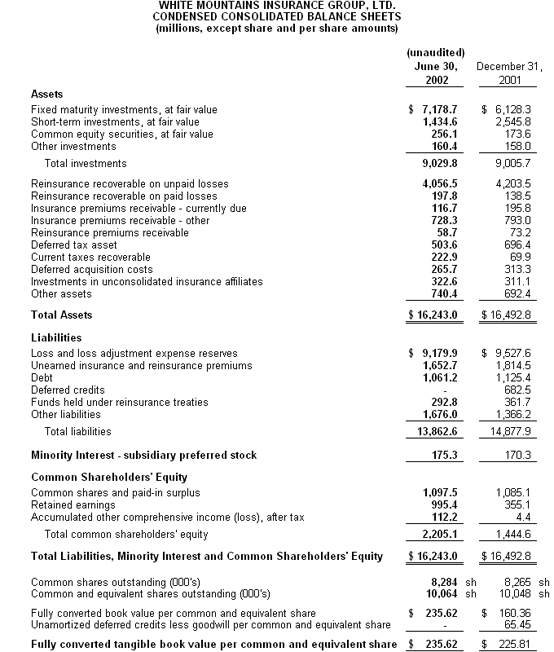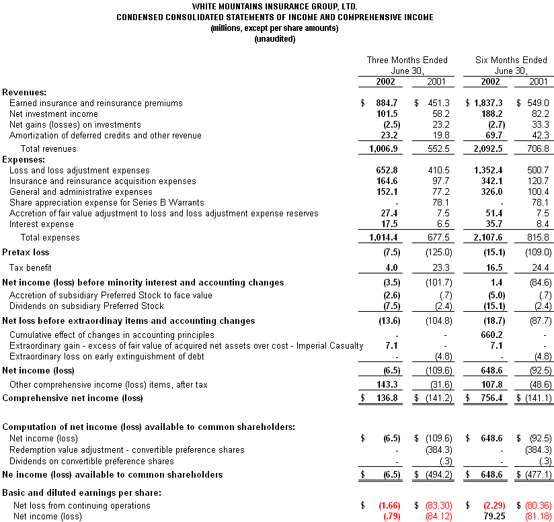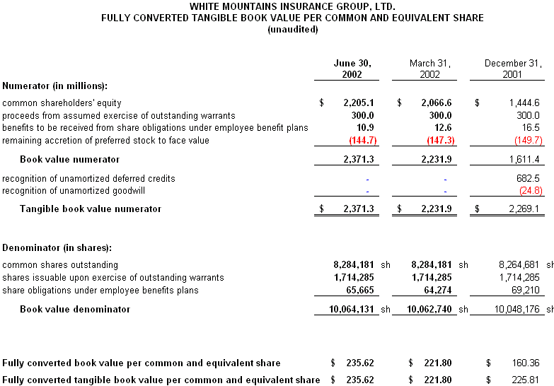White Mountains Reports Second Quarter 2002 Results
Chairman Jack Byrne said, "I am quite pleased with our position. Our core business at OneBeacon is approaching underwriting profitability. When we purchased OneBeacon, we expected we might face a couple years of operating losses while we fixed the company. We're ahead of schedule and are pleased to be able to report modest comprehensive net income for the first half of this year. Folksamerica had a lovely half year, writing lots more business at much higher prices. Our estimate of 9/11 claims is holding and our reserve indications are stable. We missed all the bullets on the investment side and emerged with a positive return through the second quarter. With our operations improving quickly and our investment portfolio conservative and liquid, we are poised to take advantage of opportunities that emerge. As has been our practice for many years, these results include full expensing of share based compensation, including a small amount of options."
White Mountains reported comprehensive net income of $756 million for the six months ended June 30, 2002, versus a $141 million comprehensive net loss for the comparable 2001 period. Comprehensive net income includes after tax operating income of $60 million at our insurance subsidiaries and $108 million of net after tax investment gains, primarily unrealized gains on fixed income securities, offset by $79 million of holding company losses, primarily after tax interest expense, other financing charges, and amortization of purchase accounting adjustments. Comprehensive net income also includes $667 million of net deferred credits which were primarily recognized during the first quarter in connection with adoption of new accounting standards.
John Gillespie, Managing Director of Investments and Capital of OneBeacon, said, "White Mountains' balance sheet is in good shape. Our invested assets are essentially in U.S. Treasuries and high-grade corporates. We have been working on our capital structure but have no immediate cash needs. We have the ability to repay the $260 million seller note which is coming due on November 29, 2002 with White Mountains common shares should market conditions not be favorable for our planned equity offering."
RESULTS OF SIGNIFICANT OPERATING SUBSIDIARIES
OneBeacon: OneBeacon reported $109 million of comprehensive net income for the six months ended June 30, 2002 and $135 million for the second quarter of 2002. After tax operating income was $36 million and $18 million for the six month and three month periods ended June 30, 2002, respectively. These amounts were offset by $22 million and $6 million, respectively, of deferred acquisition cost write-offs on the business transferred to Liberty Mutual. Comprehensive net income also includes $95 million of net after tax investment gains for the six months ended June 30, 2002 and $123 million for the second quarter of 2002. The year-to-date trade ratio for core operations (northeast regional and national specialty lines) was 103% compared to 114% for all of 2001. Business in runoff had a trade ratio of 118%. OneBeacon's total trade ratio was 109% on a year-to-date basis, compared to 119% for the full-year 2001.
Ray Barrette, Chairman and CEO of OneBeacon, said, "Our core results are clearly showing improvement with a 101% trade ratio in the quarter compared to 104% in the first quarter 2002 and 114% last year. The largest improvement is in personal lines resulting from rate and rate pursuit, good weather and the mitigating effects of our new AutoOne division on the high cost of New York involuntary automobile assignments. The personal lines trade ratio was 102% for the quarter and 105% year-to-date. Specialty lines continued showing excellent results with a trade ratio of 95% for the quarter and 91% year-to-date. Commercial lines, which are experiencing price increases in the 20-25% range, continue to improve with a trade ratio of 104% for the quarter and 105% year-to-date. Our premium volume is growing in specialty lines while exposures are shrinking substantially in commercial and voluntary personal lines due to reunderwriting and ongoing management of wind and terrorism exposures. AutoOne is doing very well."
Reinsurance: Folksamerica. Folksamerica reported $48 million of comprehensive net income during the first six months of 2002 versus a $24 million comprehensive net loss for the first six months of 2001. The results for the first six months of 2002 consist of $30 million of after tax operating income and $11 million of net after tax investment gains and a $7 million gain on the bargain purchase of Imperial Casualty which occurred in the second quarter. Folksamerica's first half-year statutory 2002 combined ratio was 99%, adjusted for the effects of retroactive reinsurance, compared to 120% for the full-year 2001.
Steve Fass, CEO of Folksamerica, said, "The combination of improving reinsurance fundamentals and benign weather patterns led to a very satisfactory quarter. The benefit of the rate increases that began in 2001 have begun to show in our bottom line. Our partnership with Olympus is working beautifully as we are able to offer our clients enhanced capacity."
Montpelier Re. White Mountains recorded $12 million in comprehensive net income from its 26% investment in Montpelier during the first half of 2002. Montpelier reported gross premiums of $340 million during the six months ended June 30, 2002 and had a combined ratio of 72% on earned premiums of $118 million during the period.
Tom Kemp, President of White Mountains, commented, "Montpelier Re had a strong first half, with very encouraging underwriting results. In the six months since obtaining its insurance license, Montpelier Re has accomplished a great deal. Most of the losses incurred are IBNR reserves set on a conservative basis."
White Mountains Underwriting, Ltd. ("WMU"). During the first half of 2002, WMU, White Mountains' newly formed underwriting manager specializing in handling international property excess reinsurance, generated $15 million of comprehensive net income. WMU's consulting contract with Olympus Re has produced significant fee income which will continue to grow in the future.
ADDITIONAL INFORMATION
White Mountains is a Bermuda-domiciled financial services holding company traded on the New York Stock Exchange under the symbol WTM. Additional financial information and other items of interest are available at the Company's web site located at www.whitemountains.com. The Company expects to file its Form 10-Q with the Securities and Exchange Commission on or before Wednesday, August 14, 2002 and urges shareholders to refer to that document for more complete information concerning White Mountains' financial results.



Safe Harbor Statement under the Private Securities Litigation Reform Act of 1995
This release includes "forward-looking statements" within the meaning of Section 27A of the Securities Act of 1933 and Section 21E of the Securities Exchange Act of 1934. All statements, other than statements of historical facts, included or referenced in this release which address activities, events or developments which we expect or anticipate will or may occur in the future are forward-looking statements. The words "believe," "intend," "expect," "anticipate," "project," "estimate," "predict" and similar expressions are also intended to identify forward-looking statements. These forward-looking statements include, among others, statements with respect to White Mountains':
- growth in book value per share or return on equity;
- business strategy;
- financial and operating targets or plans;
- incurred losses and the adequacy of its loss and loss adjustment expense reserves;
- projections of revenues, income (or loss), earnings (or loss) per share, dividends, market share or other financial forecasts;
- expansion and growth of our business and operations; and
- future capital expenditures.
These statements are based on certain assumptions and analyses made by White Mountains in light of its experience and perception of historical trends, current conditions and expected future developments, as well as other factors believed to be appropriate in the circumstances. However, whether actual results and developments will conform with our expectations and predictions is subject to a number of risks and uncertainties that could cause actual results to differ materially from expectations, including:
- the continued availability of capital and financing;
- general economic, market or business conditions;
- the acquisition and other business opportunities (or lack thereof) that may be presented to and pursued;
- competitive forces, including the conduct of other property and casualty insurers and reinsurers;
- changes in applicable domestic or foreign laws or regulations, our competitors or our clients;
- an economic downturn or other economic conditions adversely affecting our financial position;
- loss reserves established subsequently proving to have been inadequate; and
- other factors, most of which are beyond our control.
Consequently, all of the forward-looking statements made in this prospectus are qualified by these cautionary statements, and there can be no assurance that the actual results or developments anticipated by us will be realized or, even if substantially realized, that they will have the expected consequences to, or effects on, us or our business or operations. White Mountains assumes no obligation to update publicly any such forward-looking statements, whether as a result of new information, future events or otherwise.
